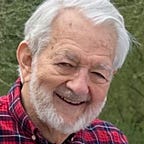Jesus was a bastard; an alternative Gospel reading
“The good shepherd did not come to pull the wool over our eyes”
The Gospels acknowledge up front, but never again, that Jesus of Nazareth was conceived out of wedlock; that is, a bastard.
The point is made in the beginning of the narratives that Mary was ‘overshadowed by the Most High’ and bore ‘the true son of God.’ And believers all over the world hold that to this day.
But the angel did not share that news with the yentas of the region. So from his nativity, the boy was the village bastard. And there was no tolerance for illegitimacy there.
And so the other boys would not play with him; the girls shunned him knowing his offspring for generations would share his shame; and the adults refused to allow him into their place of worship. All this for a sin he had not committed.
And being an outcast, he spent much of his time outside the community in the surrounding countryside, observing it closely.
As he grew, the hurt turned to anger. He saw how the townspeople accounted themselves as blameless in the eyes of the law. They observed the commandments, and were fastidious in the rituals. But they broke his heart.
And as he grew, the anger turned to rage. How is this, the man wondered. They look through me. They deny my very existence, even as they publicize their virtue.
My God, why do they abandon me!
And the rage became all-consuming. Until at last he reached the end point. The community outcast cast himself out into the wilderness. And said he would never look upon a human face again until he destroyed himself or made himself whole.
And alone, in the dark place where annihilation begins, a light shone. Moses was only half right, he realized. It is not enough to avoid evil. It is also necessary to do good.
It is not enough not to kill; we must love, even the enemy. It is not enough not to steal; rather, we must free ourselves of possessions. It is not enough to abstain from lying; rather speak truth, even to the powerful.
There are only limited opportunities to observe the laws of Moses; refrain from killing, stealing, lying.
But there are infinite opportunities to be kind, to be of service, to be free in the kingdom of giving, not in the prison of merely taking.
Later, a poet named Edwin Markham set the insight to words:
“They drew a circle that shut me out, Heretic, rebel, a thing to flout. But love and I had the wit to win: We drew a circle and took them In!”
So the outcast came in from the wilderness. But never returned to his hometown where the broken people could not forgive his becoming whole.
The stone which his neighbors rejected became the cornerstone of the entire region’s social life. Henceforth, if there was a party anywhere in the surrounding countryside, he was the evening’s entertainment; the storyteller.
And the observations he’d made as the outcast boy in the countryside became expressions to make the invisible visible: of birds of the air, beasts of the field, lilies of the valley, fig trees, seeds sown, and grapes crushed, even bowel movements and menstrual flows.
He went about doing good; mostly by reminding others they were not bad.
“The Kingdom of which I speak is made more real by one act of kindness, than by a legion of true believers splitting hairs to avoid errors.
“Do not despair, but go in peace. And in your composure be kind to all others. I say, all others.
“That you even exist, is a sign that God is pleased with you. Amen. This is so.”
© 2020, Thomas Mahon
